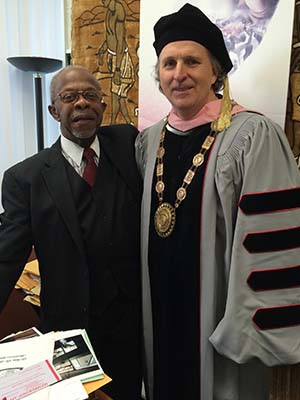
Roger Brown
Our guest today is Roger Brown, former President of Berklee College of Music and founder of Bright Horizons Family solutions, and humanitarian.
Roger talked about his career building and managing two very different education institutions. Our conversation starts from the different perspective he gained by starting his career doing humanitarian work in Cambodia, Kenya and Sudan. Roger shares how he found his passion and drive, and how he used his strategy and business skills to support the ultimate mission of ultimately building institutions who would serve families, students and artists.
KEY TAKEAWAYS
[04:15] – Why don’t we start by giving our audience just a sense of who you are, and the things that you’ve done?
[06:42] – How did you blend the two? And where did you start getting a sense of who you want to be as a leader? And, what was your calling and your goals?
[08:13] – If there were like moments or episodes where you started really crystallizing who you wanted to be? You know within the work environment. Which values you wanted to lead with? And you know, what was important to you?
[11:17] – What was the driver? And what was the process that you went through to realize that that was not right for you?
[12:22] – Was there a moment in your career when you realized that about yourself? And was there an impetus to make you say, “Oh, this is who I am, this is how I operate”.
[13:55] – I’m wondering if there was a moment where things maybe didn’t work out the way you were expecting them. But it still kind of reinforced your decision to like, stick to your own way.
[15:47] – I don’t know how you build in that resilience. But I do think successful people are, you know, everybody has failures, everybody, even the world’s most successful people.
[16:15] – In an interview saying, like, “What’s the most important quality that you have?” And he said, “you know, I always forget the last play”.
[16:37] – Did you have a definition, a personal definition of success and how you measured it? And what’s the process that you went through to do that?
[19:08] – Did you have a point when you realized, sort of what type of leader you want to be? And what were the key traits of that?
[21:53] – How did you start figuring out who you wanted to be as the leader? How you wanted to manage people? And what are some of the key traits that you looked for in yourself? And in the people that you would hire to work for you.
[23:51] – I think an early revelation for me was, you don’t need to know at all. And the sooner you admit that, the more likely these other people are to want to help.
[24:55] – Do you have advice on how to start thinking about it? Was there an experience, you know, where you started coming into this realization that as a leader, you are more effective when you asked for help or in a place where you didn’t know anything?
[27:38] – I think the same can be true when you feel yourself defensive about you know, one of your, either your peers or a direct reporter, a boss is upset that you don’t know something and you get defensive. Usually, that’s going to get in the way of you getting better.
[28:53] – I’m wondering if you have any tips for people who find themselves on either side of the equation. Whether the, you know, the creative person who is focused on delivering the best product possible and he’s faced with somebody who’s telling them “you can’t spend that” or “you need to charge more to your client”. And then the sort of the business leader, who is the person telling you that to the creative person.
[32:18] – If you would be willing to articulate when you took Berkeley, you know, the three or four like big themes of what you are trying to do?
[35:11] – We changed the whole way we do admissions, the way we do auditions. We auditioned everybody, we used to not audition everybody who came. We created tougher standards. So if you weren’t strong, we didn’t admit you.
[39:14] – The one thing that nobody ever mentions about music is that it’s the only discipline that exists in the world where you need to marry a really rigorous mathematical understanding to a creative process.
[41:04] – I think what I like, of the way you said that, “this is not the only path to be a successful musician. But we are going to provide the best version of this path for the people who want to take this path”.
[42:51] – We’d love to hear about how your passion for music has impacted, overall your career and what it’s taught you in a professional environment?
[44:48] – That’s a really interesting observation for me, because I think part of being a leader is recognizing what’s appropriate and not appropriate as a leader.
[46:00] – Every era has business lingo or jargon. And there’s always some of those that drives us crazy. So which one is the expression or that drives you crazy?
[48:22] – Final question, I call it food for the soul or food for the body.
Contact Dino at: dino@al4ep.com
Websites:
authenticleadershipforeverydaypeople.com
Guest Links:
Roger H. Brown – Official Berklee Bio
On Wikipedia
Authentic Leadership For Everyday People / Dino Cattaneo
Dino on LinkedIn: linkedin.com/in/dinocattaneo
Podcast Instagram – @al4edp
Podcast Twitter – @al4edp
Podcast Facebook: facebook.com/al4edp
Music
Susan Cattaneo: https://susancattaneo.bandcamp.com/
